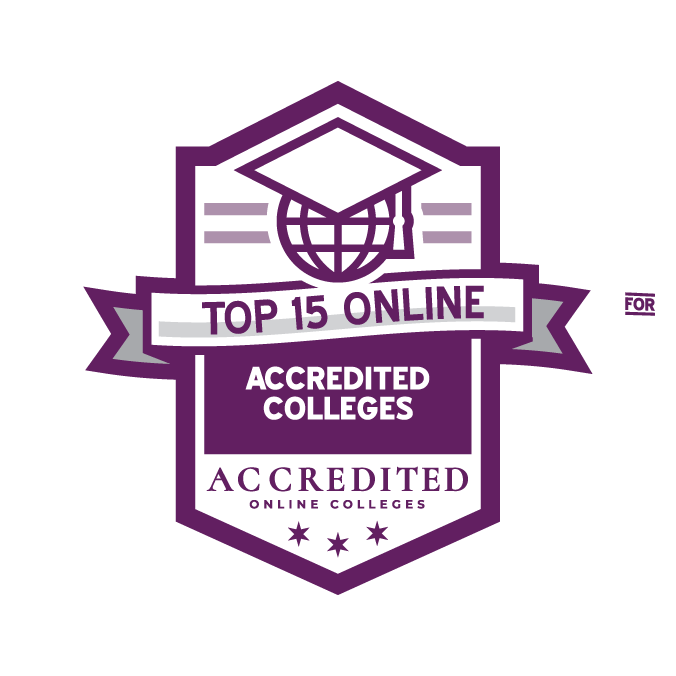A quality undergraduate or graduate degree from a noteworthy university is a valuable foundation upon which to build a successful career. But as you enter the realm of higher education, you might have a difficult time selecting a school – especially if you’re hoping to complete your education online.
The world’s best universities often offer online programs with the same academic quality as their traditional, in-person, on-campus programs. This is good news for you as an online learner.
But, not every online program is made equally. Your college search should go well beyond simply Googling “online colleges accredited.” To help you begin your search for accredited colleges online, we’ve compiled this list of the top 15 accredited schools.
Learning online offers the obvious benefit of flexibility. You can learn on your own schedule, often without worrying about “attending” online classes at a specific time. Instead, most of the online schools in our ranking include coursework that does not have specific meeting times (which is called asynchronous learning). Just do the work by the due date, and you’re all set!
There’s much more to consider when selecting a credited online university than the lure of studying when your schedule allows. The rankings below examine many other factors, including the academic quality of the school, the number of degrees available online, and the faculty who teach online courses.
See Also: 10 Tips for Maximizing Your Learning Experience in Online College
Accreditation is a Critical Component
One commonality between all the schools on this list is that they are regionally-accredited universities. Accreditation is a lengthy, voluntary process during which colleges and universities undergo a rigorous evaluation. This evaluation has internal and external components. This means that the school does a critical self-evaluation, but the school is also reviewed periodically by a group of site visitors.
In addition to these review processes, accreditation involves many other steps, including peer reviews, campus appraisals, and the development of a campus effectiveness plan. Accreditation also looks at various elements on campus, such as:
- The admissions process
- Faculty training
- The institution’s financials
- Student retention rate
This is just the tip of the iceberg, though. Accreditation, whether regional or national, is a very involved process.
What is the Difference between Regional and National Accreditation?
Regional accreditation is a more rigorous and prestigious type of accreditation for higher learning. Usually, regional accreditation is for non-profit universities. It is also the most common type of accreditation. The chances are good that the state universities where you live are regionally accredited.
National accreditation isn’t as rigorous a process (though there are still a lot of components to it). Usually, national accreditation is for trade schools, technical schools, and schools that only have an online campus are often nationally accredited. Some for-profit schools have national accreditation as well. You can read all about the differences between these types of accreditation in this guide.
See Also: Financial Aid Tips for Online College
Why Accreditation is Important
Accreditation communicates to you that a school has quality academics. Being accredited means a school meets and exceeds important educational standards, and you’re very likely to get a good education at that school. Conversely, without accreditation, the rigor of study might not be trustworthy.
There are other important elements to this as well:
- Some financial aid awards require that you attend an accredited school
- Some professional certifications require that you graduate from an accredited school
- Some employers require their employees to have degrees from accredited schools
Furthermore, your school’s accreditation status can impact whether you can transfer credits. While credits from one regionally-accredited school transfer to another regionally-accredited school or a nationally-accredited school, they do not transfer from a nationally-accredited school to a regionally-accredited school. Don’t get caught with college credits that you can’t transfer!
See Also: Laptop Tips and Tricks for Online College Students
Online Learning Requires Discipline
Online learning isn’t just about what the school offers you. Instead, to successfully study online, you should possess certain qualities, like effective time management skills.
Some people need strict deadlines and regular class meetings to be successful in college, and that’s okay! But many online learning environments do not have these features. The flexibility is great for those with the time management skills to get things done quickly.
Likewise, online learning requires that you put forth the time and effort to study, even if you’ve had a long day of work or other obligations. Having the discipline to stay current with your assignments and projects is critical to your online learning success.
Motivation and self-discipline also go into this because your studies will suffer if either of these is lacking. To help keep yourself on track, consider developing a weekly schedule with specific blocks of time set aside for reading, studying for exams, conducting research, and other activities required for your courses.
This is a good approach for adult learners, traditional students just out of high school, and distance learners. It’s also applicable whether you’re interested in certificate programs, courses at community colleges, or a four-year undergraduate degree program. Graduate students benefit from motivation and self-discipline as well!
How is This Online Universities Ranking Determined?
What are the best accredited online colleges? Let’s find out!
The 15 schools on the list below meet important factors you should consider in your college search. This includes:
- Academic quality
- Affordability
- Awards
- Reputation
- Faculty
- Diversity of degrees offered
Each school on our list of accredited online colleges has superior academic quality recognized by sources such as U.S. News & World Report. Furthermore, these schools have a long track record of success in preparing you with the knowledge and skills you need to be a leader in your chosen profession. While some colleges have reputations as “party schools,” the universities on the list below have strong reputations for academic excellence.
Likewise, the best universities online have the best faculty who are well-qualified to teach in their respective fields. Most faculty members at these schools have terminal degrees and real-world experience that allows them to deliver high-quality curricula that prepares you well for the future. The faculty at our top 15 accredited online colleges deliver their programs with the same rigor and expectations for online students as they do for on-campus college students.
Each of the schools in our ranking offer a variety of useful degrees, too. No matter if you want to study accounting, psychology, education, or something in between, these universities have the online program you need to accomplish your educational and career goals. You’ll also find that these schools offer many affordable options for completing the coursework required for your degree.
Let’s explore our listing of accredited online universities!
See Also: Top 30 Accredited Online Accounting College Degree Programs
1. St. John’s University Online

St. John’s University got its start in 1870 by the Vincentian Community as a private, coeducational Roman Catholic University. The university offers distance education to students worldwide via St. John’s University Online.
Enrolling in St. John’s University Online gives you access to small, highly interactive classes taught by faculty who are experts in their field. You can choose from various undergraduate, graduate, and certificate programs that are 100 percent online. This includes:
- Business
- Homeland Security
- Management
- Theology
- Social Justice
The base tuition for online undergraduate studies is $1,541 per credit hour. If you work towards a graduate degree online, you’ll pay between $1,400 and $1,675 per credit, depending on the program.
St. John’s University is regionally accredited by Middle States Association Commission on Higher Education. It also has accreditation at the state level by the State Education Department of New York.
2. Arizona State University Online

Arizona State University Online is another top choice among the best online schools. In fact, it’s ranked by U.S. News and World Report as having the sixth-best online undergraduate programs in the nation. The magazine ranks ASU Online sixth among online psychology bachelor’s programs and first among online business bachelor’s programs as well.
Popular programs at ASU online include:
- Psychology
- Accounting
- Engineering
- Health Sciences
- Education
Arizona State University Online offers an effective, flexible, and smart education taught by internationally-recognized faculty. As an Arizona State University Online student, you’ll have access to award-winning libraries and an expansive alumni network with tens of thousands of members.
Arizona State University Online tuition ranges from $561 to $661 per credit hour for undergraduate programs. Graduate studies are $543–$1,343 per credit hour, depending on the program. These figures include additional program fees.
Arizona State University Online is regionally accredited by the Higher Learning Commission.
3. California State University Online
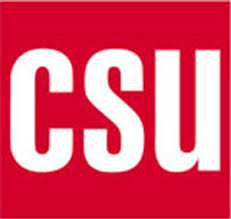
California State University Online is part of the largest and most diverse university system in the U.S. Despite its size, CSU online maintains small class sizes. Therefore, as a California State University Online student, you’ll benefit from individualized attention from world-renowned faculty and staff.
Degree programs offered at California State University Online include bachelor’s degrees, graduate programs, and doctoral programs. For example, you can pursue a:
- Bachelor’s degree in Applied, Liberal, and Interdisciplinary Studies
- Bachelor’s degree in Information Technology
- Bachelor’s degree in Business Administration
- Master’s degree in Agriculture and Natural Resources
- Master’s degree in Social Work
Two doctoral programs are also available in education and nursing.
Tuition varies depending on the level of study (undergraduate or graduate) and the degree program. It also depends on the number of units you take. For example, if you take six or fewer units of undergraduate courses, you’ll pay $1,665 per semester. But if you take 6.1 units or more, the cost is $2,871.
California State University Online is regionally accredited by the Western Association of Schools and Colleges. Some specific degree programs also carry additional accreditations.
For more about California State University’s Online Programs, go here.
4. University of Massachusetts Online

Launched in 2001, the University of Massachusetts Online, or UMass Online, offers online students dozens of degrees and thousands of courses. UMass is a top-ranked university with world-renowned faculty, so your online education is top-notch.
UMass Online has over 330,000 alumni, many of whom are highly respected industry leaders. You can join them by pursuing a degree in:
- Education
- Business and management
- Liberal arts
- Criminal justice
- Psychology
An online degree from UMass Online is just as rigorous and challenging as a traditional degree from the University of Massachusetts. Diplomas earned online have no distinction from those earned on campus.
Tuition for non-credit and undergraduate courses ranges from $125-$1,980 per credit hour. Tuition for graduate-level courses ranges from $1,230-$2,250 per credit hour.
UMass Online is regionally accredited by the New England Association of Schools and Colleges. It also has additional accreditations for various degree programs.
5. Pennsylvania State University Online

A pioneer in distance learning, Penn State began offering one of the nation’s first correspondence courses in 1892. It became one of the first major universities to offer online education in 1998. Today, Penn State Online includes students from all 50 states and countries from around the world.
Penn State Online has more than 175 degree programs and certificates. This includes popular offerings like:
- Nursing
- Psychology
- Business
- Marketing
- Finance
These degree programs are available at the undergraduate and graduate levels. There are also three doctoral-level programs available online: engineering, nursing practice-leadership, and nursing practice-nurse practitioner.
Undergraduate tuition rates depend on the number of credits you’ve completed as well as the number of credits you’re currently taking. For undergraduate studies, this means the rate varies from $620 to $664 per credit hour and $7,527 per semester to $8,125 per semester. Graduate program tuition varies depending on the number of credits you take per semester and the specific program in which you enroll. Typically, graduate tuition exceeds $1,000 per credit, but you can check the tuition for specific graduate programs here.
Penn State Online is regionally accredited by the Middle States Association of Colleges and Schools. Numerous degree programs have additional accreditations as well.
6. Colorado State University Online

Colorado State University Online offers decades of experience in delivering online education. That experience allows CSU to provide an innovative online approach to learning.
Classes from CSU Online come in many forms, including synchronous and asynchronous, self-paced, and blended learning, which combines online classes with on-campus coursework. When you take online courses, you learn from the same professors as students on campus. You also benefit from various learning tools, such as video and audio recordings.
Popular online degree programs from CSU Online include:
- Bachelor of Science in Computer Science
- Bachelor of Science in Horticulture
- Bachelor of Arts in Political Science
- Master of Engineering in Mechanical Engineering
- Master of Social Work
Undergraduate tuition is $476 per credit, plus fees. Graduate tuition ranges from $580 to more than $1,000 per credit, depending on the program.
Colorado State University Online is regionally accredited by The Higher Learning Commission. Some specific educational programs have specialized accreditations as well.
For more about Colorado State University’s Online Programs, go here.
7. Southern New Hampshire University

Southern New Hampshire University is one of the most recognizable online colleges in the country today. It’s also one of the largest with more than 200 online degree programs currently available.
If you pursue a bachelor’s degree program at Southern New Hampshire University, you’ll take courses in six eight-week terms. Condensing courses into shorter terms allows you to concentrate on fewer topics, but more intensely, before moving on to the next subject of study. Graduate programs follow a 10-week term schedule, with five terms per year.
Southern New Hampshire University is also highly affordable. Undergraduate programs are $320 per credit. There is a substantial discount for members of the military and plentiful financial aid options to help you offset those costs.
The all important question is this: Is SNHU nationally accredited? No. SNHU is regionally accredited by the New England Commission of Higher Education, Inc. (NECHE). Regional accreditation is preferred, so that’s a good thing!
8. Columbia College

Columbia College Online offers nearly 20 degree programs at the associate’s, bachelor’s, and master’s degree levels. You can also pursue online certificate programs if you wish.
You take classes in six, eight-week sessions that start throughout the year. With multiple start dates and short classes, you only need to make short-term class commitments. Additionally, you’re free to start and stop degree programs whenever you wish. This frees you to attend to life and work obligations as they arise.
Undergraduate tuition costs $375 per credit hour. Graduate tuition costs $490 per credit hour. Columbia College does not charge fees, and your books are included at no cost to you.
Columbia College Online is regionally accredited by The Higher Learning Commission.
9. American Public University
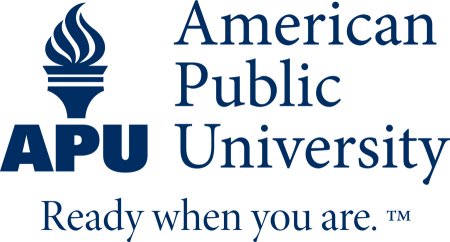
American Public University is one of the first colleges to exist solely online instead of being connected to a physical school. American Public University was founded in 2002 as an extension of American Military University, one of the first 100 percent online universities.
In the years since, American Public University’s offering of online degree programs has increased dramatically, numbering more than 200 today. Common degrees such as information technology, education, and nursing are available. Unique programs are available as well, including:
- Intelligence Studies
- Cybercrime
- Global Security
- Fire Science
- Emergency and Disaster Management
American Public University is proud of its very affordable tuition prices: Undergraduate tuition is $285 per credit hour ($250 with a military discount). Graduate tuition is $370 per credit hour (also $250 with a military discount). There is no application fee, and books are provided at no cost to help lower your expenses.
Additionally, American Public University does not require you to take entrance exams to apply. If you have transfer credits, the University will review your transcripts to ensure the maximum number of credits apply to your APU degree.
American Public University is regionally accredited by the Higher Learning Commission.
For more about American Public University’s Online Programs, go here.
10. Robert Morris University

Robert Morris University began as the Pittsburgh School of Accountancy in 1921. The name changed to Robert Morris University in 2002, and now the school offers the same quality education through Robert Morris University Online, where you can choose from dozens of undergraduate and graduate programs. Many certificate programs are also available at Robert Morris University Online.
Online classes have the same experienced professors that teach traditional classes on campus. As an online student, you also get the benefit of:
- A dedicated student counselor
- A personal academic advisor
- A financial aid counseling specialist
- Technical support for your online courses
Speaking of courses, you can take classes in any number of areas, including:
- Computer and Information Systems
- Business
- Education
- Leadership
- Nursing
Online undergraduate courses are $825 per credit. Graduate courses vary in cost from $665 per credit to more than $1,000 per credit.
Robert Morris University is regionally accredited by the Middle States Commission on Higher Education.
11. Liberty University Online
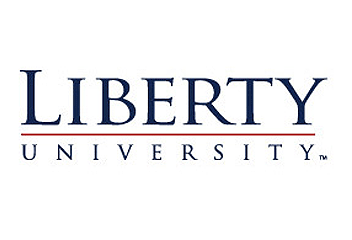
Liberty University Online is one of the nation’s largest private, nonprofit online universities. With nearly 800 online degree programs at your disposal, there is virtually no limit to what you can study. Degrees are also available at every level, from associate degrees to doctorates. Undergraduate and graduate certificate programs are also available online.
Most online courses are eight weeks long, though some extend to 14 or 17 weeks. Most class schedules are flexible to accommodate your busy schedule, so you can study at your own pace. Simply turn in assignments by the deadline, and you’re all set!
Undergraduate tuition is $455 per credit for part-time enrollment and $390 per credit for full-time enrollment. Graduate tuition is $615 per credit for part-time enrollment and $565 per credit for full-time enrollment. Some graduate programs have their own tuition schedule, though. Ph.D. and Doctorate programs vary in cost per credit from $595 to more than $1,000 per credit. Significant discounts are available for students in the military.
Liberty University Online is regionally accredited by The Southern Association of Colleges and Schools. Many of its programs are accredited or recognized by professional and accrediting agencies as well.
12. Johns Hopkins University Online

Johns Hopkins University Online is an extension of the prestigious Johns Hopkins University. The University dates back to 1876 when its founders established it as a research university with the mission of bringing knowledge to the world. In fact, Johns Hopkins is America’s first research university!
John Hopkins University’s founding principle is that education should be grounded in exploration and discovery. This principle lives on today through Johns Hopkins University Online and its diverse programs of study. There are dozens of online programs available, including:
- Master of Science in Applied Biomedical Engineering
- Dual MBA/Master of Arts in Communication
- Master of Science in Finance
- Doctor of Education
- Doctor of Mechanical Engineering
Other online programs are available in medicine, nursing, and public health, among others.
Johns Hopkins University Online is accredited by the Middle States Commission on Higher Education.
For more about Johns Hopkins University’s Online Programs, go here.
13. Virginia Polytechnic Institute and State University Online
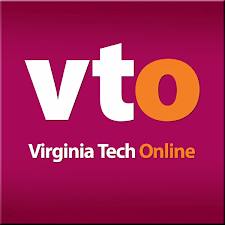
Virginia Tech dates to 1872 when it was founded as a public, nonprofit state university. Today, Virginia Tech has nearly 30,000 students on campus and online.
Virginia Tech Online offers dozens of degree and certificate programs. This allows you to work toward your educational goals at any place and at any time. Popular options include:
- Political Science
- Information Technology
- Business Administration
- Natural Resources
- Public Administration
Many unique certificate programs are also available. This includes certificates in nuclear engineering, cybersecurity policy, and big data.
Undergraduate tuition is $12,104 per year for Virginia residents and $31,754 per year for non-residents. Graduate tuition is $875 per credit hour and up, depending on the program of study.
Virginia Tech is regionally accredited by the Southern Association of Colleges and Schools Commission on Colleges.
14. Graceland University
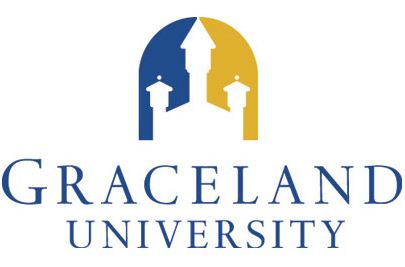
Graceland University is a private liberal arts university that got its start in 1895. Today, Graceland University online offers degrees and certificate programs for students near and far. This includes options like:
- Bachelor of Science in Nursing
- Bachelor of Arts in Organizational Leadership
- Master of Education
- Master of Arts in Religion
- Doctor of Nursing Practice
Like other schools on this list, Graceland University does not require online students to attend on-campus courses or sessions, so you can study from anywhere in the world.
Tuition is approximately $31,250 per year for undergraduate studies. Graduate and doctoral program tuition varies from one program to the next..
Graceland University Online is accredited by the Higher Learning Commission. The nursing and teaching programs have additional professional accreditations.
15. Regent University
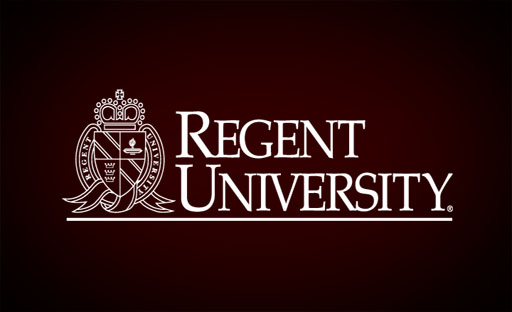
Regent University Online offers an education grounded in faith and instruction from a Christian perspective. The university’s purpose is not only to prepare you for your profession but also to prepare you as a Christian leader, ready for world impact.
Online class sizes are small, and you get hands-on assistance from a faculty mentor and advisor. Classes meet for eight weeks, which provides you with a streamlined educational experience. You can transfer up to 90 credits into your program at Regent.
Tuition is $295 per credit hour and up for undergraduate studies. Graduate programs start at $515.
Regent University is regionally accredited by the Southern Association of Colleges and Schools Commission on Colleges.
Frequently Asked Questions
Is Brandman University Accredited?
Brandman University was regionally accredited. However, it no longer exists, at least not as Brandman. In 2020, The University of Massachusetts acquired Brandman University and rebranded it as UMass Global. The school is a public, nonprofit university that’s regionally accredited by the WSCUC Senior College and University Commission (WSCUC).
When Brandman University was still active, a common question was asked: Is a degree from Brandman University respected?
The answer to that question is yes, and it’s based on a number of factors. Brandman University was accredited, which meant that the school maintained a certain level of academic rigor that allowed it to maintain accreditation. Likewise, Brandman University was part of Chapman University, which developed a solid academic reputation for online students. Now that Brandman is UMass Global, it has the backing of the University of Massachusetts and its tradition of academic excellence.
How Do I Know if a University is Accredited?
If a university is accredited, it will say so on its website, including the name of the accrediting agency. If you can’t find the accreditation information quickly, you can search the site for “accreditation,” or you can Google the university’s name plus accreditation, like: “Harvard University accreditation.”
Another method to find a school’s accreditation information is to search the Council for Higher Education Accreditation (CHEA) database. CHEA maintains a directory of more than 8,200 accredited institutions, which you can easily search by name.
Whatever you do, don’t simply rely on a list of fake online universities to determine if the school in which you’re interested is accredited or not. Lists of fake or unaccredited universities aren’t always credible. Instead, use CHEA’s database to confirm your school’s accreditation status.
Does the U.S. Department of Education Accredit Colleges and Universities?
No. The Department of Education doesn’t accredit colleges or universities. Instead, the Department has oversight powers over federally-recognized accreditors. For example, the Department of Education publishes a list of recognized accreditors that the Secretary of Education has deemed reliable. Additionally, the Department ensures that accreditors appropriately enforce their accrediting standards.
Are Programs Accredited? Or Just Schools?
The type of accreditation we’ve discussed up to this point is institutional accreditation. This type of accreditation is for an entire school, so no matter what program you enroll in, the college or university offers the same type of accreditation.
There is, however, programmatic accreditation that exists at the program level. This type of accreditation comes from professional organizations specializing in the area of study. For example, if you enroll in a teacher education program, it might have accreditation from the Council for the Accreditation of Educator Preparation (CAEP). If you’re studying psychology, the program might have accreditation from the American Psychological Association (APA). If you decide to study healthcare, the program might have accreditation from the Commission on Accreditation of Healthcare Management Education (CAHME). These are just a few examples, though.
Not all academic programs have accrediting agencies, though. As you explore possible online degree programs (like bachelor’s programs, a master’s program, or doctoral degrees), do some additional research to determine if the program is accredited and by whom.
What Other Features Should I Look for in an Accredited Online College?
As you search for a school that fits your needs, you should consider various factors beyond whether it’s an accredited institution or not.
For example, investigate the support services available to you as an online student. Is technical support available 24/7? Do you have easy access to an academic advisor or mentoring? Does the school or program offer career services? These are just a few considerations to make pertaining to support services.
Another critical aspect of your decision-making process will be the start dates the school offers. Some schools adhere to a traditional fall and spring schedule, with courses also offered in the summer. Other schools have a modified schedule with rolling start dates throughout the year. The degree of flexibility regarding when you start your studies can help you keep schools on your list or remove them.
You should also factor the program offerings into your decision. Obviously, if you’ve already decided on a major or program of study, you’ll need to find a school that offers that program. But if you’re undecided, selecting a school with a robust selection of majors helps ensure that when you make your decision, the school will likely have the program you need.
The best online colleges often have dozens of degree programs in wide-ranging areas like:
- Public health
- Computer science
- Cybersecurity
- Healthcare administration
- Education
These degrees might be an associate’s degree, an online bachelor’s degree, or a graduate degree.
Additionally, consider the online format the school provides. Are courses self-paced or are there strict meeting dates? What online learning platform does the school use? Does the school provide free laptops or other technology to assist you in your learning?
Transfer credits should be on your mind, too. As noted earlier, your ability to transfer credits from one school to the other depends on the accreditation status of both schools. Selecting a regionally-accredited school is your best bet to give yourself the best chance of transferring the most credits.
The tuition rate is a final feature to consider when choosing an online program. Some schools charge in-state tuition for online students no matter where they live, meaning you can enroll in an online school based in Indiana but pay in-state tuition if you live in Texas or Florida (or any other state). Other schools charge a specific online learning fee that’s between in-state and out-of-state tuition. Still other schools charge out-of-state tuition for online students that don’t reside in the same state as the school.
Being aware of tuition rates (and fees, too) can help you save a lot of money over the course of your education!
See Also: How Does Accreditation Affect Financial Aid? and What Are The Most Affordable, Accredited Online Associate Degree Programs?

